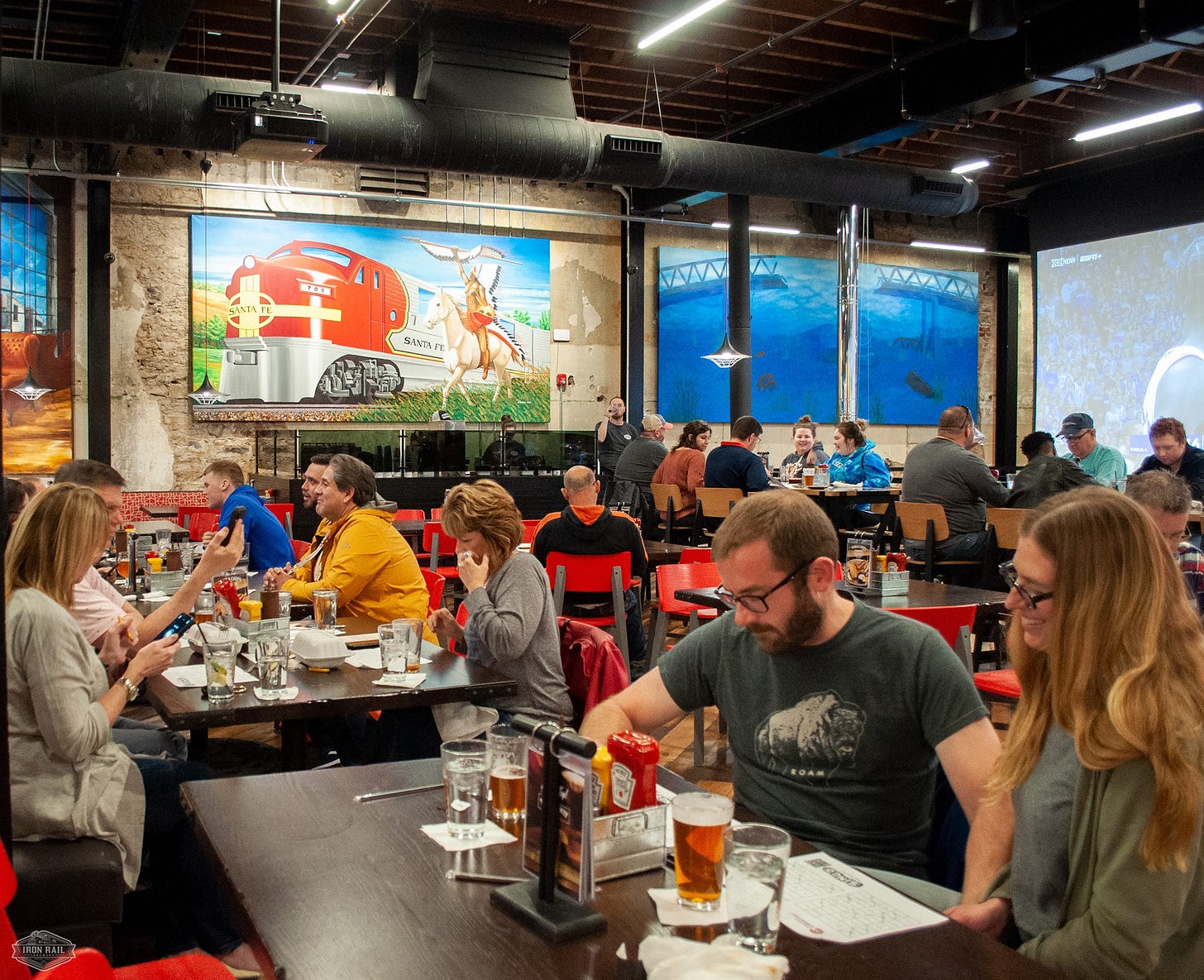Postcard from Topeka
Listening to ordinary Americans.
A mural in the Iron Rail brewery in this Kansas town depicts a red Atchison Topeka and Santa Fe locomotive, once part of the country’s largest railway, while a native chief on horseback wearing full feather headdress points the mighty train toward the west.
We, though, are headed east, on a 1,992-mile odyssey from Colorado to North Carolina to reacquaint ourselves with our country after 40 years abroad. The first Trump administration ended in a pandemic for which it did not prepare, together with mounting deficits and a violent insurrection. Swiss friends ask my husband and me why Americans brought the president back. We wanted to see for ourselves.
The mural celebrates the taming of the Great Plains with steel rails and determination. Like the railroad, which dissolved in 1996, that story is history now. Topeka seems to be following the same trajectory. We count more vacant than occupied downtown storefronts. In one, a faded sign offers $5,000 to anyone willing to move back. The unwashed window suggests no takers.
The helpful chief, too, presents a different account of America from one we heard at Colorado’s Sand Creek Massacre Historical Site. There, in the same era, a Methodist minister led an unprovoked attack against a peaceful Cheyenne and Arapaho camp, killing 600 people, mostly women and children, then desecrating their bodies.
Eager to hear what stories are told now, we eye two engineers from Ohio at the next table. With a wide grin, the white man with cropped hair tells us how the United States is going to Hell. His brother had designed the nose cone for the bunker buster bomb used in Iran, but President Bill Clinton sold the secret technology to Red China to fund his own foundation, he says. The ancient Greeks executed officials who got rich while in office and we should do the same.
His colleague rolls her eyes while he continues: USAID had funneled money to lefty NGOs but no poor people. President Donald Trump’s cuts to Medicare and food stamps only eliminate waste. The states still provide for the truly needy. He goes on: the CIA was operating without oversight. Europeans dominated the world because they used animals as sources of labor while Stone Age people from Africa ate them. He pauses to focus on his steak.
His partner, who has been sighing throughout lunch, says she voted for Trump because she thought the country needed his business acumen. Now she says he’s merely enriching himself and his family.
What keeps her up at night is her daughter, 17, adopted from Guatemala as a baby. She instructs her to carry her passport in case ICE raids sweep her up. I ask if she thinks it’s a possibility. She nods yes, but her colleague assures her that “real Americans” have nothing to worry about.
We turn our attention to a Hispanic couple sitting on our left. They, too, worry about their safety.
“If you’re not white, you’re not safe,” the man says. He goes straight home from work, keeps his head down. Friends have been arrested. Some of them “real Americans.”
The woman voted for Trump the first time but not the second. She says she’s heard the president’s new plan is to arrest anyone earning less than $50,000. I express doubt. She insists. With immunity granted by the Supreme Court, the president can act with impunity. But she won’t protest because the police are arresting and deporting demonstrators.
Back on the highway, billboards entertain us.
Black vulture issue on your farm? We can help!
A former foreign correspondent for The Guardian, The New York Times and The Wall Street Journal Europe, Alison Langley is a novelist and short story writer. Her first novel, Budapest Noir: Ilona Gets a Phone, was published by Dedalus Books in 2024 and was a finalist for the Irish Writer’s Centre Novel Prize 2022. Her work also appears in Psychedelic Yodelling, by Insurgent Press. She lives in the Swiss Alps.





The Death of Expertise, by Tom Nichols, explains a lot of this.